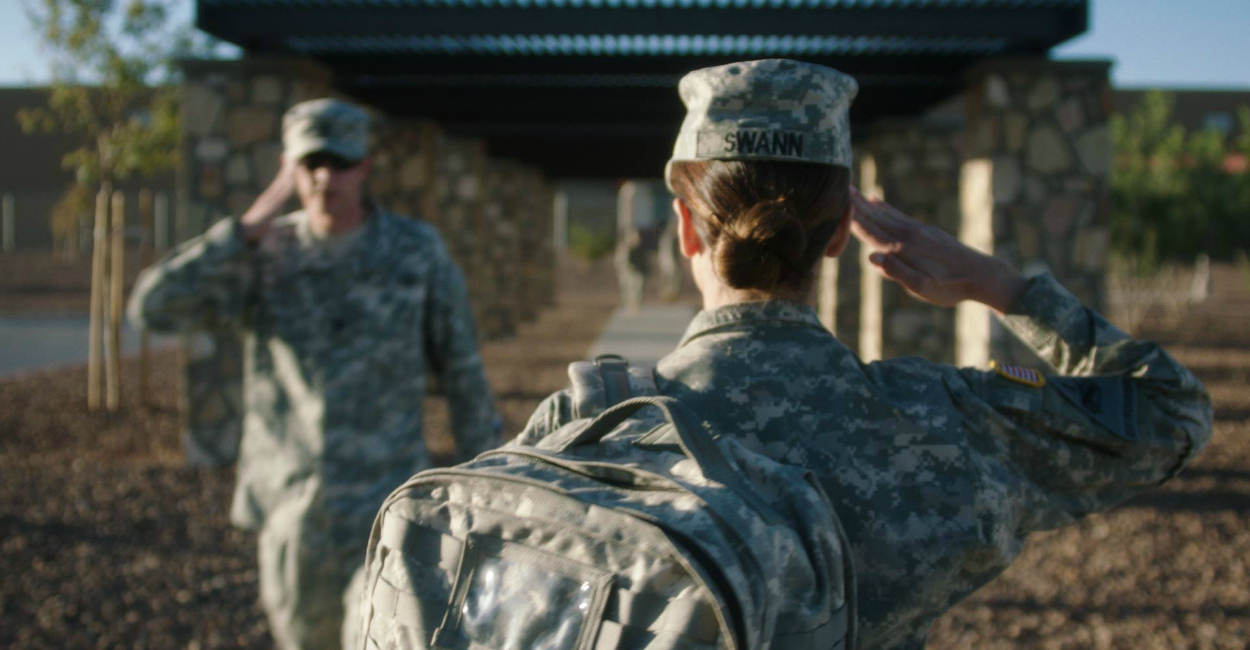For soldiers returning from faraway battlefields, coming home isn’t always easy. The acclaimed film “Fort Bliss” seeks to bring those struggles to the big screen, garnering praise from viewers and the Pentagon but a lackluster response from Hollywood.
The film, which opened to limited release in April, won the support of critics, viewers—including Secretary of Defense Chuck Hagel—and the Department of Defense. The buzz surrounding “Fort Bliss” hasn’t spread to Hollywood, however, and the film’s backers are fighting to secure theater space.
“There’s a yearning out there for what people are actually living like,” John Sullivan, one of the “Fort Bliss’” producers, told The Daily Signal. “[The movie] doesn’t pull any punches for what it’s like to be in the military. I think that [‘Fort Bliss’] is one of those rare films where it can punch a hole right through the civilian-military divide that exists.”
The movie, starring Michelle Monaghan and Ron Livingston, hardly puts the military in a glowing light. It highlights the struggles soldiers face upon returning home from war and the conflict of putting family or country first.
Monaghan plays Maggie Swann, an Army medic who returns to Fort Bliss in El Paso, Texas, after an extended tour in Afghanistan. Swann, a single, working mother, struggles to reconnect with her young son and works to rebuild the relationship she had with him before leaving for war. But Swann also finds herself grappling with issues such as post-traumatic stress disorder and sexual assault.
>>> Why Can’t We See This in the Cinema?
“Fort Bliss” doesn’t just tackle issues that affect active-duty soldiers returning from deployments. The movie also helps paint a picture of the transition families stateside go through when loved ones return home. And viewers say the movie accurately depicts what that can look like.
“The family serves, too,” Besa Pinchotti, communications director for the National Military Family Association, told The Daily Signal.
The nonprofit advocates for military families and provides support for those on the homefront. The group hosted viewings of “Fort Bliss” for military families.
Speaking about those showings, Pinchotti, whose husband was a Marine, said there wasn’t a dry eye in the theater.
“There’s one service member that signs up, or in a lot of cases there’s two, and they make that choice,” Pinchotti said. “But they’re not just the ones serving. The families serve on a daily basis. They’re here maintaining the homefront and making things OK so the service members can go and do their jobs.”
>>> Brad Paisley, Carrie Underwood Open CMAs with Dig at Democrats
Theaters around the country—especially near military bases—have started to show “Fort Bliss” after receiving requests from potential viewers. However, the movie hasn’t caught on in the same way that “Lone Survivor” and “Zero Dark Thirty” did.
“It’s ironic to me that Hollywood or the anti-military previous sentiment may be throwing the baby out with the bathwater on this one,” Sullivan said:
It’s the least action film of all of them, but one of the most resonating. It gives you a lump in your throat, and it talks about the true, shadow-side cost of war. It’s not just the soldier. It’s the family, the support network they live and die with.
Though Tinsel Town hasn’t turned its attention to “Fort Bliss,” some have called for the film to receive the industry’s top honors.
“This is a performance that deserves to be noticed,” Steven Rea, long-time film critic for the Philadelphia Inquirer, wrote in his review of the movie. “[Monaghan] is crushingly good.”
Scott Feinberg, an awards analyst for The Hollywood Reporter, said Monaghan’s performance is “worthy of serious consideration.”
Sullivan hopes that “Fort Bliss” will be seen by a wide audience—one that isn’t shy about a debate on military life.
“The film has the ability to become iconic in a way and definitely has the ability to be the tipping point in ongoing conversations about issues that those who serve are facing,” he said. “It can be a tipping point.”
During filming, military technical advisers were on set every time something Army-related was shot, and the Pentagon has been supportive of the film despite it’s raw, pull-no-punches take on Army life.
“What I want to have happen is for civilians to be better educated and wake up to the everyday sacrifices of those that serve and the family members that surround them, to chip and dissolve the civilian-military divide,” Sullivan said. “There shouldn’t be a civilian-military divide. We should be in touch with what the true costs of war are.”
>>> This Army Veteran Shakes Off Democrat Comparing Her to Taylor Swift



























